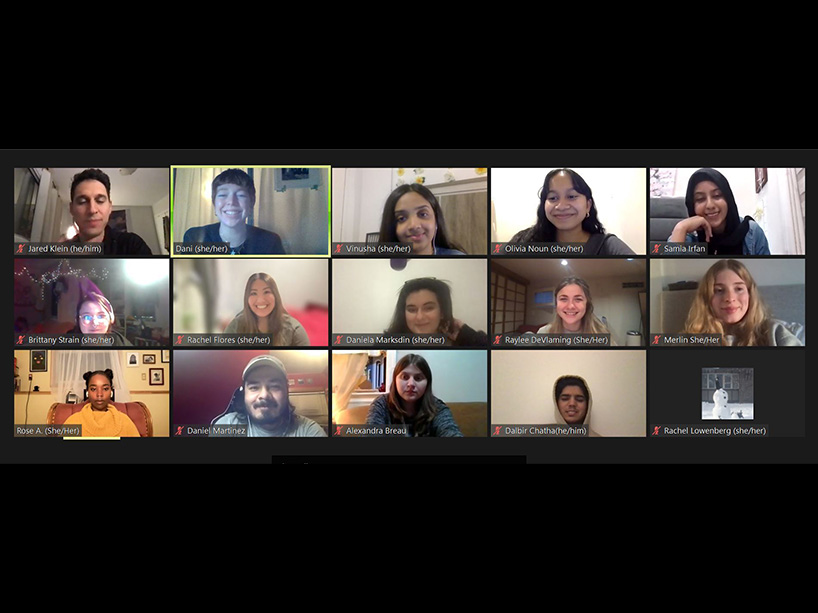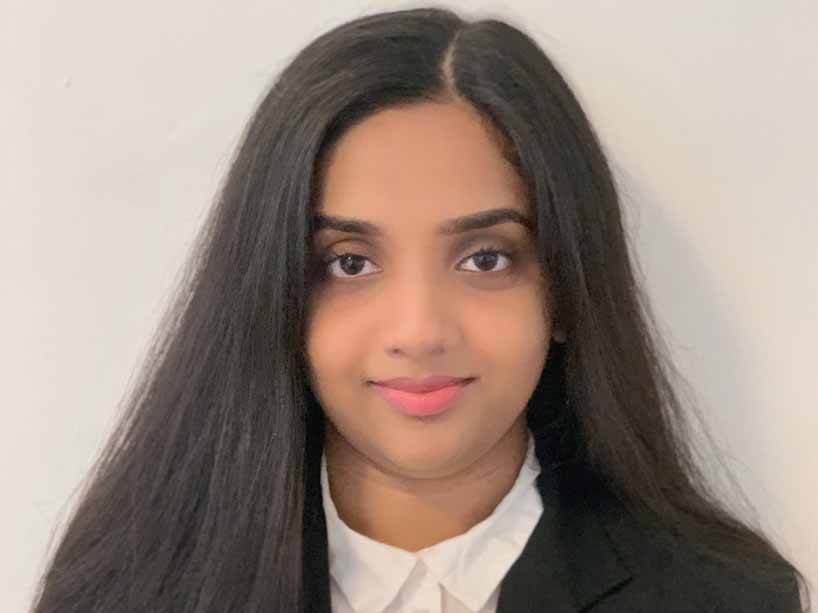Experiential course enables students to create a better future

Some students who took the Making the Future class this fall semester worked with Future Majority – a non-profit organization that aims to make politics more accessible to the youth.
Over the last two years, there have been many discussions about the social and economic inequities exacerbated by the pandemic. Going one step further, some students enrolled in Making the Future (external link) – a course that introduced students to professionals tackling these issues in real time, while providing placement opportunities where students directly contributed to finding solutions to society’s most pressing challenges.
“This course is not a conventional class. Students are not always reading or writing academic papers. They’re engaging directly with changemakers,” said Julie Anh Mai, leadership development facilitator at the Ryerson Leadership Lab (external link) , which created the course.
CSSH505 Making the Future is available to all students across the university and offered through the Faculty of Arts and The Chang School of Continuing Education. Students learn from the executive director of the Leadership Lab, Karim Bardeesy, about the urgent needs of our time and developing the leadership skills needed to bring about change.
“This semester, we focused on the pandemic and understanding the public policy response. Every week, a guest speaker shared with the students what it was like to be on the frontlines of the pandemic. We had health-care professionals talking about pop-up clinics and vaccine inequities, people who work with the Prime Minister to draft policy responses and journalists who investigate stories,” said Mai.
Further, students had the opportunity to work with two non-profit organizations and gain firsthand experience in canvassing, grassroots movements and political campaigns. Five students were selected for a paid placement with Future of Engagement (external link) and another group of 20 students worked with Future Majority (external link) .
Below, two students share how the course and their placement helped them develop a unique skill set, change their perspective on public policy and what it means to make your own future.
Gabriele Douglas, third year, economics

Gabriele Douglas describes her experience with Future of Engagement as fulfilling since she’s able to work with like-minded people towards a common goal, and gain experience in different fields such as finance and accounting, human resources, public policy and entrepreneurship.
Douglas was drawn to the course because of its focus on the pandemic and the hope that it could provide some much needed clarity.
“I always tell people to take SSH courses because these are the courses that truly shape the way you are as a student and the way you see the world,” Douglas said. “I thought Making the Future was the perfect class to take because I had so many questions about the pandemic. I used to always have the news on, watch the cases go up and we were all so confused.”
As an economics student, Douglas was already tuned in to the economic effects of the pandemic but found it interesting to learn more about the crisis from a public administration and policy lens. She went for the placement opportunity offered by Future of Engagement because the organization’s mission resonated with her in many ways.
“I was seeing that the biggest problem when it comes to politics in this day and age is that there’s a lack of access. A lot of the time people are not informed or just don’t know how to start a career in politics,” Douglas said.
Future of Engagement is a non-profit organization that enables underrepresented Canadians to access politics by finding and fixing inequitable gaps in our political system. By offering potential candidates all the resources and information they would need, the organization is helping more people from marginalized communities run for office.
“I’m helping out with many of their events like the Hackathon we just planned, for which we invited volunteers to come up with ideas for different products to solve unique problems,” Douglas said. “For example, we’re trying to digitize petitions because paper petitions can be troublesome, especially during the pandemic. And sometimes the biggest problem people face in starting their campaign is coming up with all the signatures they need to qualify for a campaign. So, we’re working on digitizing certain aspects of an election.”
One of the key takeaways from her experience is that a lot of people actually want to bring about change, they just need the right platform and starting point.
“This course has really made us think about everything from how we consume media to questioning the systems that we’re a part of and becoming better citizens so that we think more critically instead of just accepting the status quo.”
Vinusha Mahendran, third year, sociology

Vinusha Mahendran considers Making the Future to be more than just a course, as it exposed students to raw facts and experiences that not only helped them understand the pandemic better, but also gave them an entirely new way of learning from those who have dealt with real world issues head on.
Mahendran decided to take the course because it challenged students to make a future for Canada and themselves by addressing a number of policy issues.
“We’re learning about the pandemic from different perspectives. We looked at the historical aspect with a focus on Indigenous health care, we also looked at the health care system in more depth, the economy and the education system,” Mahendran said. “By hearing from guest speakers in different fields, we were able to understand the pandemic in a whole new way.”
Adding to the classroom experience of addressing urgent challenges, Mahendran has the opportunity to bring about real change by working with Future of Majority – a nonprofit organization that amplifies the concerns of young Canadians so that every candidate, politician and party is an advocate for youth priorities. It aims to increase democratic participation by engaging with young people on issues such as climate change, increased access to mental health services and more affordable rent and education.
Along with other students who took the course, Mahendran is working on a phone campaign for Mississauga residents. “We have two three-hour shifts each week where we call residents of Mississauga to talk about the climate emergency and get them to sign a petition for more government action around green development standards for buildings and homes,” she said.
Building essential skills
The students also received an initial training where they learned about deep canvassing, a method of using vulnerability and conversations to shift an individual’s personal beliefs on certain topics.
“Deep canvassing is a major tool we use when speaking to the residents because when you give vulnerability, you get vulnerability,” Mahendran said. “We learned that when discussing topics that have different perspectives and opinions, being able to have a vulnerable side brings out the vulnerability in others. So by using deep canvassing, we can shift people from being unsupportive or undecided to being supportive on issues surrounding climate action and policy.”
In fact, one of the highlights of her experience has been the realization that most people are inclined to having conversations if you’re fully open and honest with them. In her script, Mahendran uses a personal story about how climate change affects her, which she finds has often led to people sharing their own personal experiences and concerns about the future.
“Another key takeaway for me has been that when we work together as a community, we can genuinely create major change, especially in policymaking,” she said. “Prior to this experience, I thought being a changemaker would be much harder, but I’ve learned that by working together with other people, you can accomplish anything.”